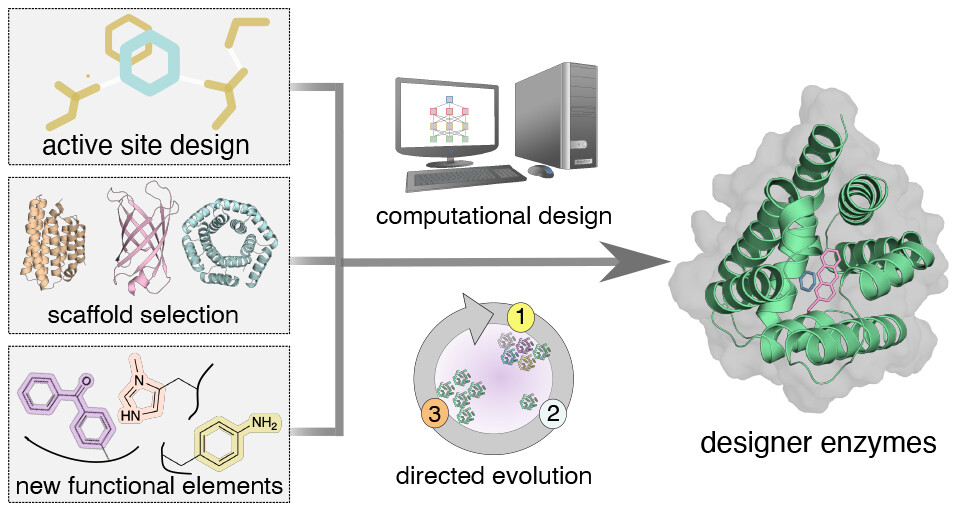EnzymoGenius™ presents a cutting-edge service specializing in the design of oligomeric enzymes, engineered to exhibit enhanced stability. This innovative solution is poised to revolutionize enzyme functionality across various applications.
Overview
The pursuit of enhanced stability in oligomeric enzymes has spurred intensive research efforts. The focus lies in the design and engineering of these enzymes to bolster their structural robustness, thereby augmenting their functional efficacy. Employing sophisticated computational approaches, researchers have endeavored to decipher the intricate relationships between enzyme structure and stability. Rational protein design strategies, including the introduction of stabilizing mutations and optimization of intermolecular interactions, have demonstrated promising outcomes. Additionally, advancements in experimental techniques such as site-directed mutagenesis and X-ray crystallography have provided invaluable insights into the dynamic behavior of oligomeric enzymes. Ongoing investigations underscore the significance of a comprehensive understanding of the structural determinants governing stability, laying the foundation for the development of enzymes with heightened resilience for diverse biotechnological applications.
 Fig. 1 Building enzymes through design and evolution. (Hossack E J, et al.,2023)
Fig. 1 Building enzymes through design and evolution. (Hossack E J, et al.,2023)
Service Process
- Bioinformatics Analysis
Employing state-of-the-art bioinformatics tools, we conduct a comprehensive analysis to identify potential oligomeric enzyme candidates.
- Structural Design
Our experts employ rational design principles to engineer the optimal oligomeric enzyme structures, focusing on enhancing stability and functionality.
- In Silico Validation
Through sophisticated computational simulations, we validate the designed enzyme structures to ensure their stability and performance in silico.
- Gene Synthesis
Following successful in silico validation, the designed enzyme genes are synthesized using advanced molecular biology techniques.
- Expression and Purification
The synthesized genes are expressed in suitable host organisms, and the resultant enzymes are purified to obtain high-quality, stable oligomeric enzymes.
Leading Technological Advantages
- Protein Engineering Expertise
Our team boasts unparalleled expertise in protein engineering, employing rational design and directed evolution techniques to create robust oligomeric enzymes.
- Computational Biology Tools
Leveraging cutting-edge computational biology tools, we precisely design and validate enzyme structures to ensure stability and efficacy.
- Synthetic Biology Techniques
Employing state-of-the-art synthetic biology methods, we synthesize genes and express them in host organisms to produce stable and functional enzymes.
- Structural Bioinformatics
Our in-depth structural bioinformatics analysis allows for the identification of key residues and domains crucial for stability in oligomeric enzymes.
Application Areas We Can Serve
EnzymoGenius™ serves a spectrum of application areas, including but not limited to:
- Biocatalysis
Our designed oligomeric enzymes find applications in biocatalysis, enhancing the efficiency and stability of enzymatic reactions.
- Industrial Processes
EnzymoGenius™ enzymes are tailored for various industrial processes, contributing to increased efficiency and cost-effectiveness.
- Medical Research
Explore new frontiers in medical research with our stable oligomeric enzymes, facilitating advancements in diagnostics and therapeutics.
- Environmental Remediation
Contribute to environmental sustainability by utilizing our enzymes in processes aimed at pollution control and waste treatment.
EnzymoGenius™ stands as a pioneering force in the design of oligomeric enzymes, offering a comprehensive service that spans bioinformatics analysis, structural design, in silico validation, gene synthesis, and expression and purification. Our leading technologies in protein engineering, computational biology, synthetic biology, and structural bioinformatics provide a competitive edge, ensuring the creation of stable and high-performance enzymes. For inquiries and collaborations, please contact us.
Reference
- Hossack, E. J.; et al. Building enzymes through design and evolution. ACS Catalysis. 2023, 13(19): 12436–12444.

































 Fig. 1 Building enzymes through design and evolution. (Hossack E J, et al.,2023)
Fig. 1 Building enzymes through design and evolution. (Hossack E J, et al.,2023)